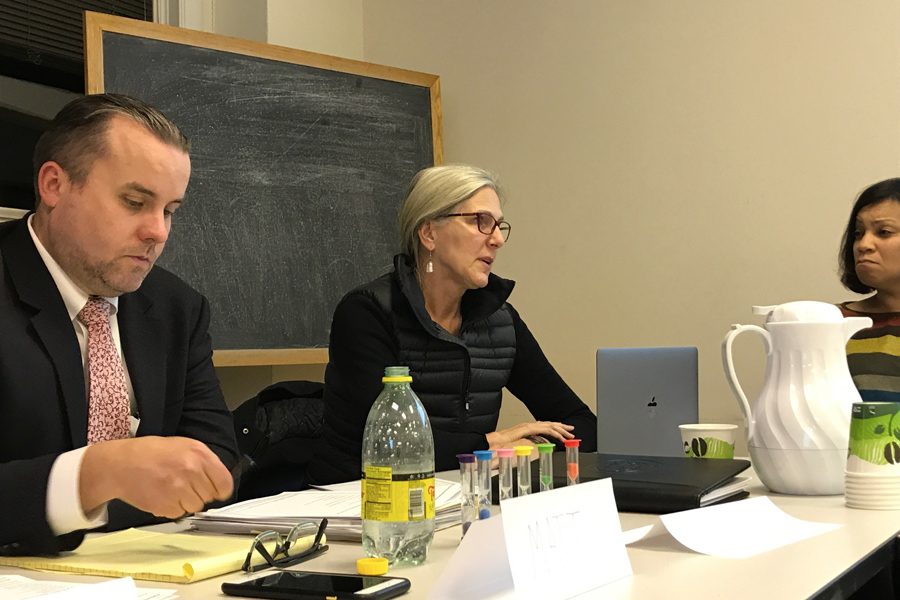Committee emphasizes importance of trust between Evanston police, residents
Nikki Baim/The Daily Northwestern
Citizen Police Complaint Assessment Committee member Karen Courtright speaks at Wednesday’s meeting. The committee decided to focus on creating trust between Evanston police and citizens.
November 2, 2017
The Citizen Police Complaint Assessment Committee emphasized its goal to establish deeper trust between Evanston police and residents at its Wednesday meeting.
The committee — which held its first meeting last month — was established by Mayor Steve Hagerty to examine the Evanston Police Department’s complaint process. On Wednesday, committee members said only 17 formal complaints were filed last year to EPD due to lack of trust. They also said the police have discouraged residents from filing complaints.
“A larger cultural change has to happen,” committee member Jeff Parker said. “Our larger goal here is to make sure that the citizens trust the system. … We have to make sure that officers trust the system as well.”
To build trust, Parker said, more officers should live in Evanston so they can share the culture with residents. Currently, 12 out of the 165 total officers employed by EPD live in the city, Evanston police Cmdr. Joseph Dugan told The Daily.
Dugan said police do not discourage residents from filing complaints.
Some complaints can be resolved at the supervisor level and don’t need to go through the whole process, he said. However, the department still documents the complaint if it is only discussed with a supervisor.
“We take every complaint that comes in,” Dugan said.
Committee member Karen Courtright said at the meeting that citizens are “afraid” to make complaints. She shared stories of two incidents when residents tried to file formal complaints about responding officers’ behavior, but were discouraged from doing so.
“That’s sending a message,” Courtright said. “Whatever you say isn’t going to be handled in a serious fashion, so you might as well just go home.”
In addition, many Evanston students — in both college and high school — are unaware that the complaint process even exists, Northwestern graduate student and committee member Randy Foreman said.
“Living here for my whole life, I had no idea (the complaint form) was a thing,” he said. “If I saw a police officer do something or heard about it, I’d grumble about it and I’d feel powerless.”
Committee members discussed how in some communities, mediation — when the officer and complainant sit in a room to talk about the incident — is used as part of the police complaint process. Members said mediation could be implemented in Evanston’s process through the committee’s work.
They added that other work to bridge the culture gap between police and residents potentially includes youth education.
The James B. Moran Center for Youth Advocacy, for example, has a program that brings teens and police together for activities and relationship building. At the end of one session, committee member Joi Russell said, a youth and an officer were “crying in each other’s arms.”
“Initially there was some hesitancy on both the part of the officer as well as the youth,” she said. “It’s a little piece of trying to change that culture … of how community members and officers see one another.”
Going forward with the review, committee members said they will research Evanston’s demographics and compare the city’s complaint process with those of other communities.
Email: [email protected]
Twitter: @nikkibaim22


